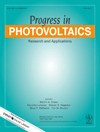
PROGRESS IN PHOTOVOLTAICS
Scope & Guideline
Empowering Research in Renewable Energy Technologies
Introduction
Aims and Scopes
- Photovoltaic Materials Science:
Research exploring the physical and chemical properties of materials used in solar cells, including silicon, perovskite, and thin-film technologies. This involves studies on material synthesis, defect characterization, and improvements in efficiency. - Device Engineering and Efficiency Optimization:
Focus on the design, fabrication, and optimization of photovoltaic devices. This includes advancements in cell architectures, interconnections, and the implementation of new technologies like bifacial and tandem solar cells. - Reliability and Degradation Studies:
Investigations into the long-term performance, reliability, and degradation mechanisms of photovoltaic modules, aiming to enhance their lifespan and efficiency under various environmental conditions. - Sustainability and Lifecycle Analysis:
Research dedicated to assessing the environmental impact and sustainability of photovoltaic technologies, including lifecycle assessments, material sourcing, and recycling technologies. - System Performance and Integration:
Analysis of the performance of photovoltaic systems in real-world applications. Studies focus on energy yield predictions, performance loss evaluations, and the integration of solar technologies into buildings and vehicles.
Trending and Emerging
- Perovskite Solar Cells and Tandem Technologies:
Research on perovskite solar cells and their integration with silicon cells in tandem configurations is rapidly increasing, driven by their potential for high efficiency and low production costs. - Bifacial PV Technologies:
The interest in bifacial solar modules is surging as they offer improved energy yield by capturing sunlight from both sides, making them a key focus area in recent studies. - Advanced Characterization Techniques:
Emerging methodologies for characterizing photovoltaic materials and devices, such as machine learning and advanced imaging techniques, are becoming increasingly prevalent in research. - Sustainable Practices and Circular Economy:
There is a growing emphasis on sustainability within the photovoltaic sector, focusing on recycling, material sustainability, and life cycle assessments to support a circular economy. - Integration with Electric Mobility and Smart Grids:
Research is increasingly exploring the integration of photovoltaic systems with electric vehicles and smart grid technologies, reflecting a broader trend towards sustainable energy solutions.
Declining or Waning
- Conventional Single-Junction Solar Cells:
Research on traditional single-junction solar cells has declined as the focus shifts towards more advanced technologies such as tandem and bifacial solar cells, which promise higher efficiencies. - Organic Photovoltaic Technologies:
Interest in organic photovoltaics has decreased, possibly due to challenges related to stability and efficiency compared to inorganic alternatives, leading to a reduced number of publications in this area. - Dye-Sensitized Solar Cells (DSSCs):
Research on DSSCs has become less frequent as the industry and academia increasingly prioritize other technologies that offer better scalability and commercial viability. - Utility-Scale PV Systems without Integrated Solutions:
There is a noticeable decline in publications focusing solely on utility-scale systems without integration solutions, as more studies now emphasize the integration of PV with energy storage and smart grid technologies.
Similar Journals
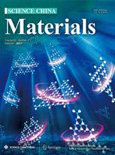
Science China-Materials
Transforming Ideas into Materials Innovations.Science China-Materials is an esteemed peer-reviewed journal dedicated to advancing the field of materials science, published by SCIENCE PRESS. With a strong focus on innovative research and applications, this journal provides an essential platform for disseminating groundbreaking findings in materials development, characterization, and engineering. Since its inception, Science China-Materials has achieved an impressive Q1 ranking in the Materials Science (miscellaneous) category, reflecting its commitment to quality and the impact of its publications, as indicated by its 86th percentile ranking in Scopus. The journal is set to converge its contributions from 2016 to 2024, making it a vital resource for researchers and professionals interested in the latest advancements and trends in materials science. As an open access publication, it ensures that knowledge is freely available to a global audience, promoting collaboration and innovation across disciplines. The journal is headquartered in Beijing, China, and continues to attract high-quality submissions from leading experts in the field.
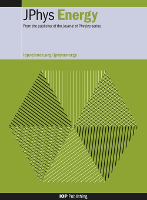
Journal of Physics-Energy
Catalyzing Breakthroughs in Interdisciplinary Energy ResearchJournal of Physics-Energy, published by IOP Publishing Ltd, is a leading Open Access journal that serves as a dynamic platform for the dissemination of high-quality research within the interdisciplinary realms of energy, materials science, and materials chemistry. Since its inception in 2019, the journal has gained remarkable recognition, achieving a prestigious Q1 ranking in multiple categories in 2023, highlighting its impact within these rapidly evolving fields. With its Scopus Ranks, placing it in the top 10% of journals for General Energy and within the top 20% for Materials Science disciplines, it reflects the commitment to excellence in research and innovation. Conveniently based in the United Kingdom, the journal is designed to facilitate collaboration and knowledge exchange among researchers, professionals, and students dedicated to advancing the understanding of energy technologies and materials science. The open access model ensures that cutting-edge research is freely available, promoting global accessibility and engagement with the latest scientific advancements.
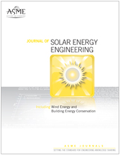
JOURNAL OF SOLAR ENERGY ENGINEERING-TRANSACTIONS OF THE ASME
Transforming Ideas into Impactful Solar Engineering Practices.JOURNAL OF SOLAR ENERGY ENGINEERING-TRANSACTIONS OF THE ASME is a premier publication dedicated to advancing the field of solar energy engineering, under the auspices of the prestigious American Society of Mechanical Engineers (ASME). With the ISSN 0199-6231 and E-ISSN 1528-8986, this journal has established itself as a critical resource for researchers and professionals alike, particularly in the areas of energy engineering and renewable technology. Currently enjoying an impact factor that places it in the Q2 category for Energy Engineering and Power Technology and Q3 for Renewable Energy, Sustainability, and the Environment, this journal effectively bridges impactful research and practical application. Spanning contributions from 1980 to 2025, the journal emphasizes empirical studies, innovative methodologies, and sustainable solutions that resonate with the growing global demand for renewable energy. The journal’s commitment to quality is reflected in its competitive Scopus rankings: 97th out of 272 in Energy Engineering and 124th out of 270 in Renewable Energy. Although not an Open Access journal, it remains a vital forum for disseminating research that shapes our energy future. Located in New York, this journal serves as a cornerstone for those in academia and industry to stay abreast of the latest advancements in solar energy technologies and their application in sustainable development.
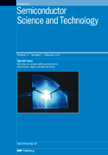
SEMICONDUCTOR SCIENCE AND TECHNOLOGY
Illuminating the future of electronics with groundbreaking insights.Semiconductor Science and Technology is a pivotal journal in the fields of condensed matter physics, electrical and electronic engineering, and materials science, published by IOP Publishing Ltd. With an ISSN of 0268-1242 and an E-ISSN of 1361-6641, this esteemed journal has been disseminating groundbreaking research since 1986 and is set to continue through 2024. Recognized in the latest categorizations, it holds a notable Q2 ranking in Condensed Matter Physics, Electrical and Electronic Engineering, and Materials Chemistry, alongside a Q3 ranking in Electronic, Optical, and Magnetic Materials, highlighting its significant contribution to the advancement of these disciplines. Although it does not operate under an open access model, the journal provides critical access options for researchers and professionals seeking to foster innovation and collaboration within the semiconductor community. As a vital resource, Semiconductor Science and Technology not only supports the dissemination of high-quality research but also serves as a platform for emerging trends and developments that are shaping the future of semiconductor technology.

Solar RRL
Illuminating the path to energy efficiency and breakthroughs.Solar RRL, published by WILEY-V C H VERLAG GMBH in Germany, is a premier journal dedicated to advancing the field of solar energy research and technologies. With an impressive Q1 ranking across key disciplines—including Atomic and Molecular Physics, Electrical and Electronic Engineering, and Energy Engineering—this journal stands out as an authoritative source of high-impact research. Since its inception in 2017, Solar RRL has provided a platform for the dissemination of innovative ideas and findings, making vital contributions to the understanding of solar energy conversion, efficiency improvements, and sustainable technology. Researchers, professionals, and students seeking to stay at the forefront of solar energy advancements will find invaluable insights and rigorous studies in its pages. Although currently not an open-access journal, Solar RRL offers a subscription model that gives readers access to cutting-edge research that shapes the future of energy technology.
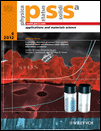
PHYSICA STATUS SOLIDI A-APPLICATIONS AND MATERIALS SCIENCE
Advancing the frontiers of materials science.PHYSICA STATUS SOLIDI A-APPLICATIONS AND MATERIALS SCIENCE, published by WILEY-V C H VERLAG GMBH, stands as a prominent journal in the fields of condensed matter physics, materials science, and engineering. With an ISSN of 1862-6300 and E-ISSN 1862-6319, this journal has been actively contributing to scientific discourse since its inception. The journal currently holds a respectable Q2 ranking across several categories including Electrical and Electronic Engineering and Materials Chemistry, demonstrating its significance in advancing research and development within these domains. Although it does not offer open access, the journal ensures high-quality peer-reviewed content that is critical for researchers and professionals aiming to stay at the forefront of materials science innovations. The journal’s convergence years, extending from 2005 to 2024, reflects its ongoing commitment to publishing impactful research. By facilitating discussions on applications and advances in materials science, PHYSICA STATUS SOLIDI A continues to be an essential resource for those striving to contribute to this dynamic field.
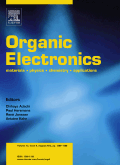
ORGANIC ELECTRONICS
Transforming Knowledge into Innovation in Organic ElectronicsORGANIC ELECTRONICS, published by Elsevier, is a premier journal dedicated to the rapidly evolving field of organic electronics, encompassing a spectrum of interdisciplinary research from materials chemistry to electrical engineering. As a crucial resource for researchers, professionals, and students, the journal boasts significant impact, currently ranked in the Q2 category across multiple fields, including Condensed Matter Physics, Materials Chemistry, and Electrical and Electronic Engineering. With a commitment to advancing knowledge and innovation from its base in the Netherlands since its inception in 2000, ORGANIC ELECTRONICS not only provides critical insights into organic materials and their applications but also fosters collaboration among scientists through its comprehensive findings and high-quality articles. The journal does not currently offer open access but provides various access options for subscribers. With its HIndex signaling substantial academic output and engagement, ORGANIC ELECTRONICS remains an essential platform for groundbreaking research that is shaping the future of technology.

Advances in Energy Research
Advancing Knowledge for a Greener Energy Future.Advances in Energy Research is a prominent journal dedicated to the exploration and advancement of energy technologies and sustainable practices. Published by TECHNO-PRESS, this journal serves as a vital platform for researchers, professionals, and students in the energy field, featuring innovative studies and reviews that contribute to the body of knowledge surrounding energy efficiency, renewable resources, and the integration of new technologies. The journal holds a significant position in energy research and aims to facilitate the dissemination of groundbreaking findings and ideas that are pivotal for the transition toward a more sustainable energy future. Located in South Korea, with an ISSN of 2287-6316, it embraces an open access philosophy that ensures widespread availability of its content, further enhancing its impact in the academic community.
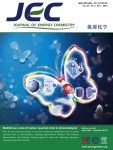
Journal of Energy Chemistry
Catalyzing Knowledge in Energy SystemsThe Journal of Energy Chemistry, published by Elsevier, is a premier international journal that has established itself at the forefront of research in the fields of electrochemistry and energy technology. With an impressive impact factor, this journal is classified in the Q1 quartile across multiple categories including Energy Engineering and Power Technology, Fuel Technology, and Electrochemistry, underscoring its significant contribution to advancing knowledge and innovation in energy systems. Based in the Netherlands, the journal offers open access to its cutting-edge research, allowing for broad dissemination and engagement among researchers, professionals, and students alike. The scope of the journal spans crucial topics from chemical energy storage to sustainable energy solutions, making it an essential resource for those looking to understand and contribute to the evolving landscape of energy chemistry.

INTERNATIONAL JOURNAL OF PHOTOENERGY
Transforming Light Energy into Scientific BreakthroughsThe INTERNATIONAL JOURNAL OF PHOTOENERGY, published by HINDAWI LTD, is a pivotal open-access journal that has been advancing knowledge in the field of photoenergy since its inception in 1999. With an impact factor that reflects its growing influence in the scientific community, the journal spans a range of critical categories, achieving Q2 rankings in Atomic and Molecular Physics, Chemistry, and Materials Science as of 2023, as well as a Q3 ranking in Renewable Energy. The journal supports research dissemination through its open-access model, empowering global access to high-quality studies that explore innovative applications of light energy. Housed in the United States with a dedicated focus on interdisciplinary research, the INTERNATIONAL JOURNAL OF PHOTOENERGY serves as an essential platform for researchers, industry professionals, and academics aimed at solving today's energy challenges and promoting sustainability through the harnessing of photoenergy.